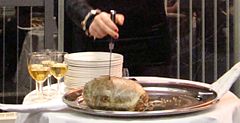Noc Burnsa
 | |
| Dzień | okolice 25 stycznia |
|---|---|
| Państwa | |
| Zwyczaje | uroczysta kolacja |
| Upamiętnia | |
| Inne nazwy | Noc Burnsa, |
Noc Burnsa (sco. Burns Nicht, również Dzień Roberta Burnsa, sco. Robert Burns Day, właśc. Kolacja Burnsa, sco. Burns supper) – szkockie święto obchodzone na cześć Roberta Burnsa, narodowego wieszcza Szkotów celebrowane w okolicach przypuszczalnego dnia jego narodzin tj. 25 stycznia.
Święto, którego ceremoniałem jest między innymi zwyczaj wypicia whisky przy pomniku poety, obchodzone jest zarówno w Szkocji, jak i w Irlandii Północnej. Również poza granicami kraju Szkoci organizują takie wieczory. Szkocki akcent można także spotkać w Polsce[1].
Aby uczcić urodziny i poezję swojego wieszcza, Szkoci celebrują uroczystą kolację, na której wysławia się haggis (tradycyjną regionalną potrawę), kobiety i whisky. Kolacja rozpoczyna się dźwiękiem dud szkockich i „Odą do haggisa”, wierszem, który Burns napisał na cześć tej szkockiej potrawy. Dalsze części kolacji to toasty wznoszone whisky: toast do haggisa, toast za Damy i toast za Panów, czytanie poezji i śpiewanie pieśni „wielkiego Robbie'ego Burnsa” oraz zabawa taneczna céilidh przy tradycyjnej muzyce (poza dudami są to skrzypce, akordeon, flety, bodhrán) wykonywanej na żywo.
Przypisy
- ↑ Rozrywka: Szkocka Noc Burnsa, [w:] pmedia.pl [online] [dostęp 2021-11-13] [zarchiwizowane z adresu 2006-09-10].
Bibliografia
- The Burns Supper, [w:] World Burns Club [online], 2004 [dostęp 2021-11-13] [zarchiwizowane z adresu 2004-10-01].
Media użyte na tej stronie
Ulster Banner is a heraldic banner taken from the former coat of arms of Northern Ireland. It was used by the Northern Ireland government in 1953-1973 with Edwardian crown since coronation of Queen Elizabeth II, based earlier design with Tudor Crown from 1924. Otherwise known as the Ulster Flag, Red Hand of Ulster Flag, Red Hand Flag.
Ulster Banner is a heraldic banner taken from the former coat of arms of Northern Ireland. It was used by the Northern Ireland government in 1953-1973 with Edwardian crown since coronation of Queen Elizabeth II, based earlier design with Tudor Crown from 1924. Otherwise known as the Ulster Flag, Red Hand of Ulster Flag, Red Hand Flag.
Autor: Kim Traynor, Licencja: CC BY-SA 3.0
Cutting the haggis at a Burns Supper. Traditional Scots fare is not always appreciated by visitors to Scotland.
- "The Haggis is a dish not more remarkable or more disgusting to the palate, than in appearance. When I first cast my eye on it, I thought it resembled a bullock's paunch, which you often meet in the streets of London in a wheel-barrow; and, on a nearer inspection, I found it really to be the stomach of a sheep, stuffed till it was as full as a football. An incision being made in the side of it, the entrails burst forth, and presented such a display of oatmeal, and sheep's liver, and lights, with a moseta that accompanied them, that I could scarcely help thinking myself in the Grotto del Cane. As I mentioned, my politeness got the better of my delicacy, and I was prevailed on to take it; but I could go no farther: and, after a few encomiums on its being tender and savory, which I thought sufficient to show that I was not wholly destitute of Taste, I turned a hungry face towards a large tureene in the middle, which the master of the feast called Cocky-leaky; and, with the greatest appearance of luxury and glee in his countenance, extracted from a quantity of broth, in which it had been boiled with leeks, a large cock, which I dare say had been the herald of the morn for many a year. This, he exclaimed, would be exquisite, if the cook had taken care that the broth was sufficiently seasoned; and after he had tasted it, he declared that it exceeded his highest expectations. During this time, I found some of the company pay great attention; and, on the verdict being given, seemed rather impatient: but as I was a stranger, and had not blessed my appetite with a considerable degree of Haggis, my plate was filled first, and I began upon it, whilst their eyes were all fixed on me to hear me pronounce the sentence; which I did, indeed, in the words of the verdict, but with some reluctance; for it was so hard and tough, that it seemed to require the stomach of an ostrich to digest it." -- Edward Topham, Letters From Edinburgh, 1775



